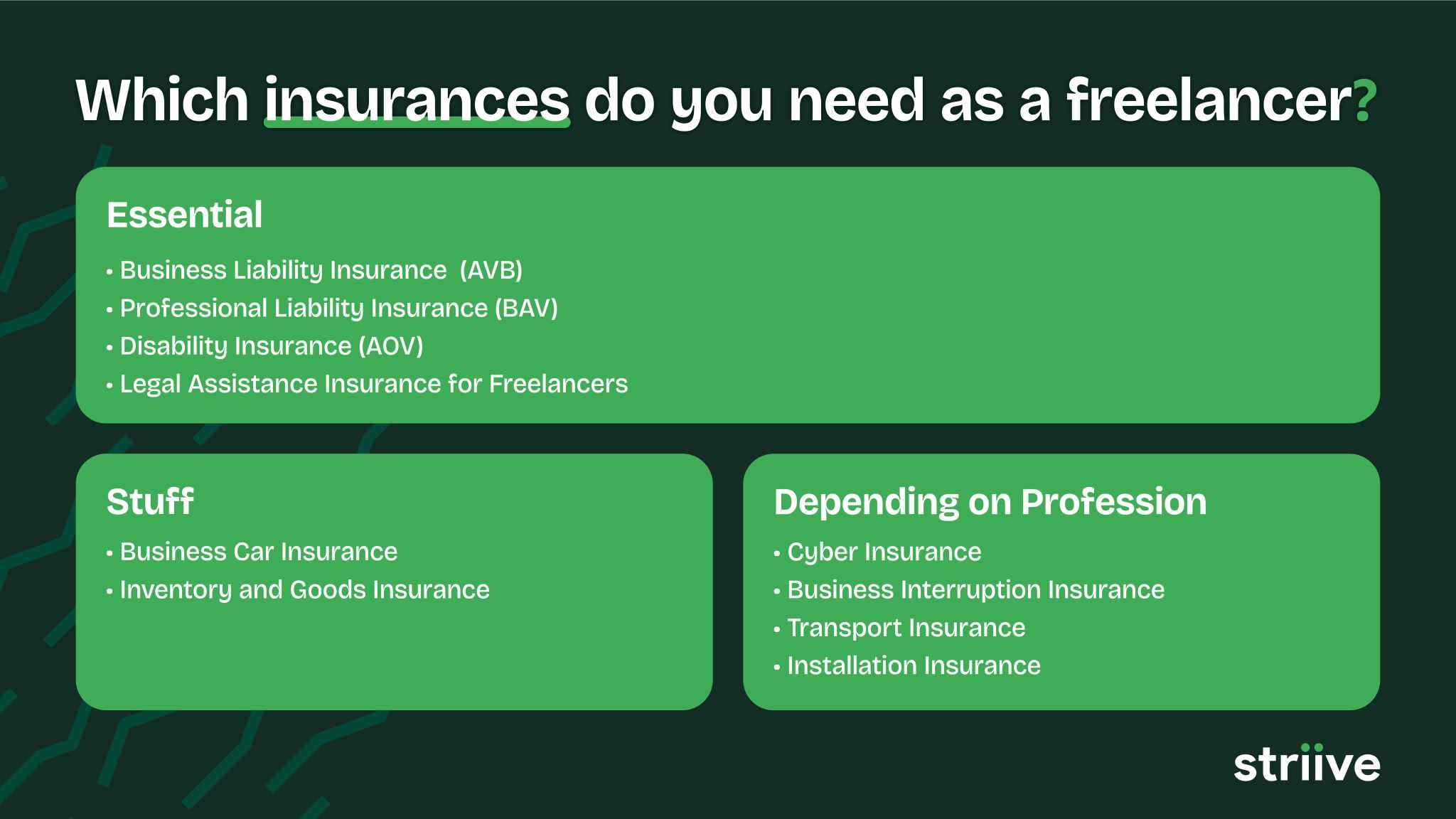Which insurances do you need as a freelancer?
As a self-employed professional, you are responsible for your own risks. Mandatory insurance is limited, but essential policies such as AVB, BAV, AOV, and legal assistance are highly recommended. Costs depend on your profession and coverage, but there are smart ways to save. Being well insured is an investment in your own success.
As an independent professional (self-employed), you are your own boss. That gives freedom, but also responsibility. What happens if you get sick, cause damage, or end up in a legal dispute? Unlike employees, you have no safety net. That’s why insurance is not a luxury, but a smart investment in your future. In this blog, you’ll read which insurances are mandatory, which ones you really need, and how to keep them affordable. This way, you can make the right choices with confidence.
Mandatory and Common Self-Employed Insurances
Not every insurance is legally required for freelancers. Still, there are a few you can hardly do without. Think liability, disability, and legal assistance. Some insurances are even required by clients or industry organizations.
Are there mandatory insurances for freelancers?
For most freelancers, you’re free to choose. However, there are exceptions:
- Industry-specific requirements: Do you work as a medical specialist, financial advisor, or architect? Then professional liability insurance is often mandatory.
- Business vehicles: Do you use a van or company car? Then business car insurance is required.
- Contractual obligations: Some clients require you to have liability or disability coverage.
Always check the conditions of your industry and clients.
A closer look at essential freelancer insurances
Below are the most important insurances for freelancers, with explanations and examples.
Business Liability Insurance (AVB)
This insurance covers damage to other people or their property caused during your work. For example:
- You accidentally knock a client’s expensive laptop off the table.
- During a job, you damage an office floor.
Especially useful for freelancers who do physical work or often work on-site.
Professional Liability Insurance (BAV)
This insurance covers damage caused by mistakes in your work. For example:
- A financial advisor gives incorrect advice, causing a client to lose money.
- A graphic designer delivers the wrong file, ruining a print job.
Essential for freelancers in advisory or knowledge-based professions.
Disability Insurance (AOV)
If you get sick or injured, you have no right to continued salary as a freelancer. A disability insurance provides income if you cannot work temporarily or long-term.
Note:
- You choose the waiting period (e.g., 1 or 3 months).
- You decide the amount you want to insure.
- You choose how long the payout lasts.
Alternative: A “bread fund,” where you save together with other freelancers and support each other during illness.
Legal Assistance Insurance for Freelancers
Conflicts with clients, suppliers, or the tax authorities? This insurance provides legal help and advice.
Example:
- A client refuses to pay.
- You receive a fine you disagree with.
Business Car Insurance
Do you mainly use your car for business? Then you need business car insurance. It covers damage from accidents, theft, or vandalism.
Note: Private insurance often does not cover damage during business trips.
Inventory and Goods Insurance
Do you have a workshop, office, or stock? This insurance protects your belongings against fire, theft, or damage.
Example:
- Your laptop is stolen from your office.
- Water damage occurs in your workspace.
Other important freelancer insurances
Depending on your work, these may also be relevant:
- Cyber insurance: protection against data leaks and hacks.
- Business interruption insurance: compensation for downtime due to damage.
- Transport insurance: for freelancers who transport goods.
- Installation insurance: for damage during installation or assembly.

What do freelancer insurances cost and how to keep them affordable?
Costs depend on:
- Your profession and risks
- Your revenue
- The coverage you choose
- Your age and health
- The deductible
On average, you pay between a few tens and hundreds of euros per month. But: being well insured prevents high costs when things go wrong.
Tips to save on your freelancer insurances
- Compare providers: use online tools or ask for advice.
- Choose a higher deductible: this lowers your premium.
- Bundle insurances: some providers offer discounts.
- Check your coverage annually: does your insurance still fit your situation?
Your security as a freelancer: an investment in the future
Insurance is not an expense, but a smart choice. It gives peace of mind, security, and ensures you can keep doing what you’re good at - even when things don’t go as planned.
👉 Stay up to date with smart freelancer tips and updates: sign up for our newsletter!